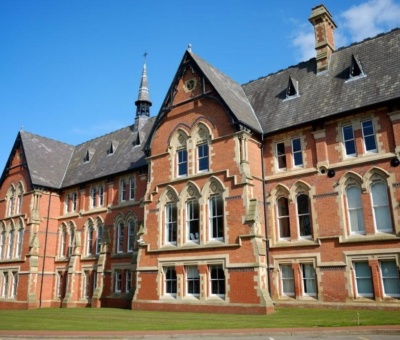Exciting International Partnerships at CHS – Mr Wilson (CHS Teacher, Modern Languages)
In 2018 we launched our Modern Languages Pathway in the Sixth Form. Head of Modern Languages, John Wilson, tells us about the international partnerships we have developed CHS.
This term has seen exciting progress at CHS with our international partnerships. Many staff and students will be able to tell their own personal account of how our international partnerships have helped them. My own experience comes from our Year 11 students hosting students from IES Conde de Orgaz in Madrid when they came in order to participate in MUNCH. Then, when we visited Madrid just a few weeks later, we were welcomed onto their territory. We spent a great day at the School which is located in a socially deprived area of the Spanish capital – the state-funded school, with limited resources, is highly successful, inspiring children from a range of backgrounds to fulfil their potential, running a full bilingual learning programme (English Spanish) and attracting art students for their specialised sixth-form pathway from far and wide. Indeed, our own Art students will collaborate with them when they visit Madrid in April. Speaking on behalf of each of us who visited, I can say with confidence that we left inspired, looking forward to adapting some of what we had seen in our own classrooms.
The very next day in Madrid, with our students visiting the wonderful city of Segovia with the other CHS staff and some of the students from IES Conde de Orgaz, I visited SEK El Castillo, an international school in the more affluent suburbs of the city with a view to setting up a traditional language exchange. The outcome was much better though – not only will there be a traditional-style exchange during next academic year, but we will also look to develop opportunities for extended stays for students, staff exchanges for all subject areas, teaching and learning conferences, summer camps and more.

This is nothing new for CHS … by the time you read this, our students will be with our partner school – in The Gambia – staff and students on that fantastic visit, used to our facilities, will, once more, be humbled by the resourcefulness of those who work and learn in the school, making great things happen with very little. Before they departed for the small African nation, my excited tutees told me how they were looking forward to working with the local children on painting the extension to the school which has been made possible by their own committed fundraising back here. You can find out more about the visit to The Gambia here.
Indeed, back here, we have all benefited from having our exchange students from KZU Zurich with us for a term for the second year running. Another big moment this term was Prithvi Shaw, aged 19, scoring a century on test match debut for India in October and publicly describing his experience of spending the summer term as a Year 8 CHS pupil in 2012, a long way outside his comfort zone, as a major stepping stone towards developing the required mindset for a successful test match batsmen. I encourage our students to actively participate in the range of options developed to engage with international partnerships too – the rewards are so widespread.

As a school, we are increasingly embracing the opportunities presented by international partnerships – and, just as we have welcomed the students from Switzerland this term, our own L6 students will have further opportunities to spend extended periods abroad at that school and at other schools where we are forging lasting partnerships. This academic year alone we have L6 students about to go to Switzerland and, as long as they approach the experience with an open mind, they will have an invaluable experience. The best people to ask about how to approach things are the Swiss students who have spent the term as Waconians. So, before they returned home, I spoke to them about their experiences and the advice they would give to others considering such an experience …
Both said that they were more confident as young adults and underlined the importance of celebrating and embracing all that is different about the partner school. For example, they have enjoyed the contrasting co-curricular opportunities and loved the different classroom dynamics here at CHS. They felt that they were able to cement friendships very quickly as the CHS students immediately welcomed them into the community which is already culturally diverse. Having loved the opportunities presented in the Languages Pathway, through teaching languages at our partner primary schools, they are going to return to their school and lead the way in carving out similar partnerships in their local communities.
They both said unreservedly that they felt truly privileged to have had the opportunity and encouraged other students on both sides of the partnership to follow them. So, what of our host students? The many CHS students who have formed strong friendships with the Swiss students feel that they have been fundamental in developing wider perspectives and general open-mindedness in our community. In a world where, unfortunately, difference can all too often be a conversation stopper, we are proud that across our partnerships difference is the principal conversation starter.
One of our students who will be spending 6 weeks at the Swiss school next term shared her understandable apprehension but overriding excitement about the opportunity which lies ahead, she cannot wait to build friendships and take her German to the next level. Another, who is not a sixth-form linguist, looks forward to sharing his passion for science and technology with other like-minded students, perhaps picking up from where he left off from IGCSE to develop his German too. When I spoke to him this week he said excitedly, “I’ve always enjoyed learning languages but there is nothing more rewarding than putting what you have learned into practice and having a real conversation with someone in a language that isn’t your first. As well as speaking the language, I am also very interested in learning more about Swiss culture, since I know hardly anything about it at the moment. Hopefully, this will include trying national foods, viewing the landscape and sampling the weather. Going to school in Zurich will also be very exciting since I will be able to witness contrasting teaching methods and courses, as well as studying more subjects than I am right now. At the end of the trip, I will also be going skiing which I have never done before. So, it should be amazing! I’m sure it will be an experience that I will never forget and I am extremely lucky to be going!”

In the current political climate we all find ourselves questioning what the future holds for our role in the international community but it is very comforting and exciting that at CHS we are looking to exploit all that our international partnerships have to offer. These partnerships will grow and they will offer a range of opportunities to our students. As long as we accept that we will need to be prepared to exit our comfort zones and be open to new ways of approaching things, there will be a host of benefits for staff and students. Whilst, for obvious reasons, our linguists would be advised to take these opportunities, they are certainly not exclusive to linguists as our partner schools have bilingual streams.
If you have any questions about what is available, please get in touch. I also ask you to get in touch if you feel that you can contribute to helping us be more internationally aware as a community. If you need more convincing about the values of operating outside your comfort zone and being resourceful, there is lots of material out there. However, I encourage you to listen to this podcast from Farah Storr, the Editor of Cosmopolitan magazine, of the talk she gave recently at LSE. Farah spent an extended period out of her comfort zone in France and views that experience as fundamental to her success in life.

John Wilson
Head of Modern Languages
@chs_linguists


